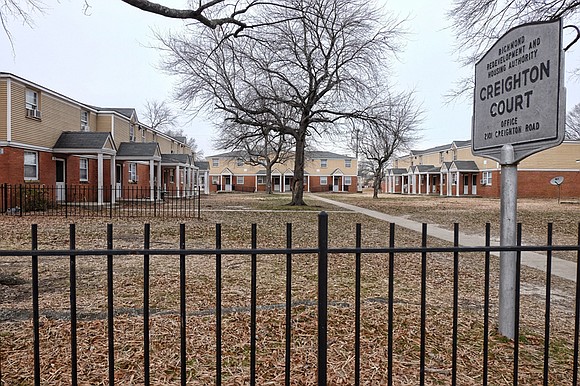Work begins in Creighton Court
Jeremy M. Lazarus | 1/26/2018, 11:26 a.m.
By Jeremy M. Lazarus
Work is finally underway to restore heat in 12 buildings in the Creighton Court public housing community, a failure of a basic service that has come to symbolize the deteriorating state of Richmond’s “public housing stock.”
After more than two months, the Richmond Redevelopment and Housing Authority put a contractor to work Monday installing electric baseboard heaters in the affected units that are home to more than 50 families.
RRHA disclosed the new effort in letters to residents and in a report to City Council.
The $209,000 project that is expected to take 30 days to complete began in the wake of the abrupt resignation Sunday of T.K. Somanath as RRHA’s chief executive officer.
He resigned amid sharp criticism over the authority’s slow pace in addressing the failure of heating systems in those buildings. He acknowledged knowing about the lack of heat since October.
According to RRHA, the Creighton Court problem highlights the increasing problems with the condition of “our public housing stock” and the need “for total replacement of this housing as rapidly as possible.”
The letters to residents and the City Council report stated the new baseboard heat, which requires new wiring, is expected to take 10 to 12 hours to install in each unit. Residents were promised an overnight stay at a hotel at no charge if necessary, with protection for their possessions.
“We recognize this is still disruptive,” RRHA’s letter stated, “but we will work with each family to make the process as simple and quick as possible.”
RRHA also promised that families would not have to pay for the electricity needed to operate the new heaters.
The decision to go with electric baseboard heat was made after RRHA found it would cost at least $1.3 million to replace the leaky, worn-out pipes feeding hot water to radiators, a cost it could not afford.
In the report to the council, the authority confirmed that the issue of leaking heating pipes in Creighton Court was first identified in five buildings last spring, but no action was taken except to shut down the furnaces.
Mr. Somanath insisted in media reports that the management of RRHA was kept in the dark about the problem until the new heating season began in October. RRHA has acknowledged that its internal controls and its reporting mechanisms were flawed, and gave too much discretion to lower-level staff.
By that time, more buildings were found to have leaking pipes, RRHA stated. Furnaces in at least 12 buildings were shut off by December as bitter cold arrived and additional pipes began leaking.
RRHA, which also had to fix heating problems in Gilpin Court and was moving ahead with plans for replacement of heating systems in Fairfield Court, initially distributing space heaters to affected residents in Creighton Court.
But residents began to complain publicly when the space heaters could not do the job in the face of frigid temperatures.
Meanwhile, RRHA stated that it continued to make plans for replacing the pipes that feed hot water to units and allows hot water from boilers to flow to radiators.
Weeks into the emergency, RRHA finally dropped the replacement idea and went with the cheaper baseboard alternative after consulting with Dominion Energy, the authority stated.
In its report, RRHA stated that current properties with more than 3,000 units are wearing out after 50 or more years of use. The authority has documented more than $150 million in unmet maintenance needs, though only $4 million a year in federal funds is available for improvements.
“Aging infrastructure means that it is going to get worse before it gets better,” the report stated.
Meanwhile, RRHA’s Board of Commissioners is reviewing its strategy for responding to emergencies to “better address future challenges” stemming from worn-out equipment and ensuring better communication between management and maintenance staff.
At the same time, the report stated that RRHA would need “the support of the city and its residents to help with the transition of this old stock into new homes for our residents.”








